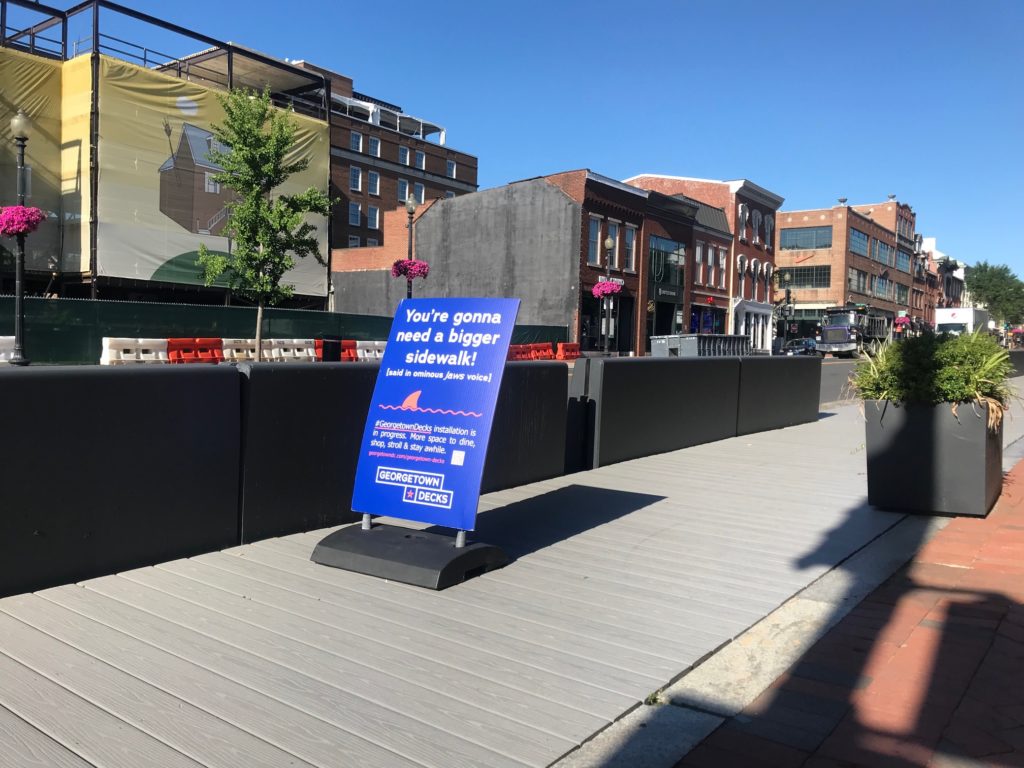Streateries Project Extended, Most Widened Sidewalks Not
By • December 13, 2021 0 1607

After waiting through nine hours of Zoom meetings, the nail-biting fate of expanded sidewalks in Georgetown for diners and pedestrians finally came up Thursday Dec. 9, the last item of a long agenda of DC’s Committee on Public Space. After 45 minutes of at times passionate objections and defense of the pilot project that has been in place since about April 2021, the decision was made: almost all of the well-used expanded sidewalks in front of eateries – the so-called streateries up and down M St and Wisconsin Ave. in Georgetown – were given a one-year extension permit by the Department of Transportation Committee. But almost all of the expanded sidewalks on M St. and all of them on Wisconsin Ave., will be removed over the next few months.
“There is no appeal,” both Rick Murphy, the chair of the Georgetown/Burleith Advisory Neighborhood Commission and Tara Sakraida Parker, President of the Citizens Association of Georgetown (CAG), told The Georgetowner. “We are disappointed as both our organizations opposed keeping any of the platforms that widened pedestrian sidewalks.”
Primary among the objections to the expanded sidewalks — that were almost always visibly underutilized and empty of pedestrians — according to Parker, were the loss of over 100 parking spaces vital to small businesses. That pushed parking of visitors and shoppers into Georgetown’s historic and narrow residential streets where parking is already tight. That impacted Georgetown traffic flow and safety.
All the ANC Commissioners and CAG board members – all of whom are unpaid volunteers – supported the streateries. “The outside dining has undoubtedly helped restaurants and livened up Georgetown,” said Parker. But the aesthetics of the mobile extension platforms framed by heavy cement street blockades, do not fit the historical aesthetics of Georgetown, she noted, repeating the criticism of ANC Commissioner Elizabeth Miller.
“I had been hopeful that the Public Space Committee would not give permits to more of the expanded sidewalks, including at bus stops,” said Murphy. “But in the end, they completely adopted the 2022 proposal of the Georgetown Business and Improvement District – the tax supported community planning organization that was in charge of developing, implementing and evaluating the $1.5 million pilot project – to remove most of the widened pedestrian sidewalks and keep the streateries and bus platforms.
Removal of most of the expanded sidewalks will return 65 parking/loading spaces, according to BID CEO Joe Sternlieb. The extended project will continue to evaluate all aspects of traffic flow and safety as well. Detailed maps are available on the Georgetown BID website of all the changes that will be made in 2022.
The Old Georgetown Board on Dec. 2 approved of an approximately six-month extension of the project per the BID 2022 proposal. “They told us they didn’t understand our objections,” CAG’s President Parker told The Georgetowner. That despite its having worked for decades with the OGB defining architectural projects which have an impact on Georgetown. CAG was established in 1878 as the District of Columbia’s first civic group.

